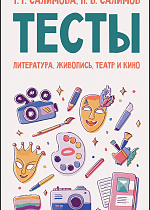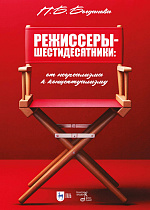Теория кино - все книги по дисциплине. Издательство Лань
Сохранить список:
Excel
Excel
Закрыть
Выгрузка списка книг доступна только авторизованным пользователям. Авторизоваться
Вашему вниманию предлагается сборник тестов, состоящий из более чем тысячи вопросов. Первый раздел посвящен общим вопросам географии, культуры, истории России и истории русской музыки, литературы, живописи, отечественного театра и кино. Остальные три раздела посвящены соответственно зарубежной литературе, живописи, театру и кино. Тесты прекрасно подойдут для подготовки к коллоквиумам, экзаменам и зачетам по направлениям «литературоведение», «киноведение», «искусствоведение», «театроведение», «режиссура», «актер театра и кино», а также «музыкальная журналистика», «музыковедение», «дирижирование», и будут весьма полезны не только выпускникам, абитуриентам и студентам, но и педагогам студий, специализированных школ, училищ и вузов.
The current edition represents a collection of tests consisting of more than a thousand questions. The first section is devoted to general questions on geography, culture, history of Russia and the history of Russian music, literature, painting, Russian theatre and cinema. The other three sections are devoted to foreign literature, painting, theatre and cinema. Thе tests are perfect for getting ready for colloquiums, exams and tests in the following areas: “literary studies”, “film studies”, “arts studies”, “theatre studies”, “directing”, “theatre and film actor”, as well as “music journalism”, “musicology”, “conducting”, and will be quite useful not only for graduates, applicants and students, but also for teachers of studios, specialized schools, colleges and higher schools.
The current edition represents a collection of tests consisting of more than a thousand questions. The first section is devoted to general questions on geography, culture, history of Russia and the history of Russian music, literature, painting, Russian theatre and cinema. The other three sections are devoted to foreign literature, painting, theatre and cinema. Thе tests are perfect for getting ready for colloquiums, exams and tests in the following areas: “literary studies”, “film studies”, “arts studies”, “theatre studies”, “directing”, “theatre and film actor”, as well as “music journalism”, “musicology”, “conducting”, and will be quite useful not only for graduates, applicants and students, but also for teachers of studios, specialized schools, colleges and higher schools.
Материал учебного пособия охватывает период российского советского театра с 1950-х по 1980-е годы. Направлен на раскрытие деятельности поколения (в лице его ведущих представителей О. Ефремова, А. Эфроса, Г. Товстоногова, Ю. Любимова), которое в этот период возглавляло театральный процесс и прошло определенную эволюцию от эпохи «оттепели» к эпохе краха «оттепели». Если поколение начинало свою деятельность с позиций неореализма, развития системы К. Станиславского, с современной пьесы В. Розова, А. Володина, Э. Радзинского и др., то к 1970-м годам оно перешло на классику, на стиль концептуализма, который вылился в замкнутые тоталитарные модели спектаклей. Такая эволюция раскрывает усиление драматических переживаний ведущих режиссеров, связанных с изменениями социально-культурной ситуации в стране.
The textbook content covers the period of Russian Soviet theatre between the 1950s and the 1980s. It aims to describe the activities of the generation (represented by its leading figures O. Efremov, A. Efros,
G. Tovstonogov, Y. Lyubimov), which during this period headed the theatre process and went through a certain evolution from the “thaw” era to the decline of the “thaw” era. Starting its activities from the point of neorealism, the development of the K. Stanislavsky system, from the modern play of V. Rozov, A. Volodin, E. Radzinsky, etc., by the 1970s it turned to the classics, to the conceptualism style, which resulted into reserved totalitarian models of performances. Such an evolution reveals the intensification of the dramatic experiences of leading directors associated with changes in the socio-cultural situation in the land.
The textbook content covers the period of Russian Soviet theatre between the 1950s and the 1980s. It aims to describe the activities of the generation (represented by its leading figures O. Efremov, A. Efros,
G. Tovstonogov, Y. Lyubimov), which during this period headed the theatre process and went through a certain evolution from the “thaw” era to the decline of the “thaw” era. Starting its activities from the point of neorealism, the development of the K. Stanislavsky system, from the modern play of V. Rozov, A. Volodin, E. Radzinsky, etc., by the 1970s it turned to the classics, to the conceptualism style, which resulted into reserved totalitarian models of performances. Such an evolution reveals the intensification of the dramatic experiences of leading directors associated with changes in the socio-cultural situation in the land.
Закрыть
Сообщить о поступлении
Укажите ваш e-mail, и мы пришлем уведомление, как только книга
станет доступна для покупки.



